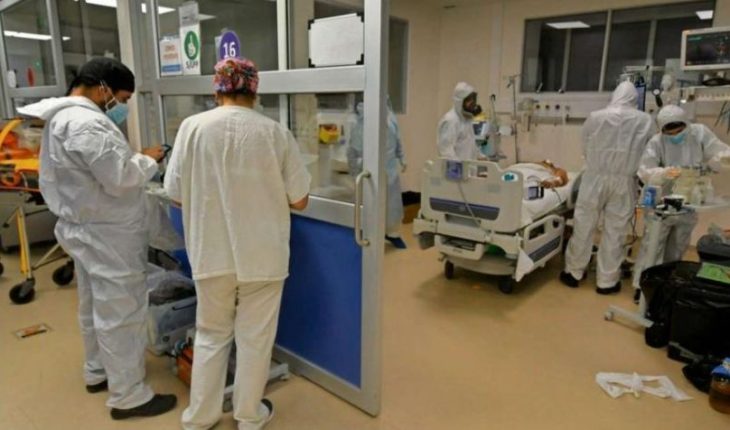Opening the Minsal’s recent pandemic reports has brought some peace of mind to Dr. Darwin Acuña. For the president of the Chilean Association of Intensive Medicine (Sochimi), the number of patients with severe hospitalized covid in recent weeks began to fall allows them to think that they might be seeing “the light at the end of the tunnel” of this second wave, which led the country to have a peak of 3,406 infected at UCIs 14 days ago. Today is around 3,100.
“We are slowly moving towards the end of the second wave,” says the leader, who says that with the upsurbing since March the critical network has experienced a situation “that Chile had never faced,” enabling more than 4,500 beds to meet requirements, numbers that exceed those projected for regrowth.
How are UCIs now?
Context remains complex. We are working with a number of beds which is very increased and still very busy. Covid patients are very high. You don’t have to downshed that situation. But over the past few days bed requirements and hospitalizations have been down a bit, probably as an impact on health measures and declining contagions.
Now you can stop opening extra beds, as has been done almost daily in the reopening?
A superhuman effort was made, much more opened than we thought and now with this low requirements we are already in a situation where we probably will not require opening many more beds. We don’t know how much longer we’ll have to keep the ones that are open, but fortunately the demand to open beds is already declining. But this is still in a very critical situation. It’s not like we’re freed and closing beds. If you go to the great hospitals of Santiago, the Barros Luco, the Sotero (Del Rio), they are still very busy.
How do critical staff receive these new figures?
It creates peace of mind. This should at some point lead to a more basal situation in UCIs. But it also worries that any sign of relief must be interpreted and communicated in a good way, so that people understand that as long as we don’t have effective herd immunity the pandemic is going to remain very latent and the possibility of infection and seriously sickness is going to still be alive.
Are you worried about trust?
It creates a lot of fear for regrowthes can happen. If there was a very quick regrowthe of cases, that would bring us back to nine thousand (daily contagions) that would impact the UCIs. In addition, patients will slowly increase, not covid by those who start leaving their homes after quarantine, which start to produce more traumas caused by car accidents, also with complications of chronic diseases. We have seen that in countries in Europe they go as in the fourth wave and here in Chile it can also be the same.
Could the critical network withstand a new wave?
The health staff’s mindset is amazing. We’re all tired, we’re having a hard time getting up, the team ends up much more exhausted than before, but the commitment remains the same. We have a vocation of service with our people and we cannot let a patient die from inasurement. If a third wave arrives, nor God willing, we must work and give it no more, but it would be fair for all the measures taken and the behavior of the population to be coherent enough not to lead us to that.
And would the infrastructure be over the face of another relapse?
Right now with the 4,500 beds we’re on edge. When they thought they were going to reach 5 thousand or 6 thousand beds to me it seemed practically impossible, because of an infrastructure issue, by the staff (in quantity, not in commitment). I found it very complicated. So the third wave, if it were to occur, I hope it is equal to or less than this, because the internal situation is very complex to think about opening 5 thousand or 6 thousand beds.
How have you seen the impact of new waves on the world at the critical network level?
There are different cases. In Israel they achieved herd immunity, which allowed them to lower contagions and incomes to UCIs a lot, so much so that they are almost returning to normal life. And there are cases like Spain, which have had low immunity and have freely chosen to make life more normal, therefore they are more exposed to more waves with high cases and with high UCIs occupation. Everything goes very hand in hand with the country policy of how to deal with the pandemic
And with Chilean reality, how nCould I hit you?
If we continue with the logic that vaccine immunity decreases the risk of admission to ICU, Chile’s vaccination rhyme should have an impact on the occupation. Let’s hope that when a third wave could occur at that point, much more population will be vaccinated. But the situation of Magellan is worrying, that having a high percentage of the vaccinated population is experiencing a third wave. They are again with a high bed occupancy and have even had to produce transfers back from patients to other regions.
Could that change pandemic control projections through vaccination?
It’s just that we have to go to the analysis of the sick population. The first result that showed the Sinovac vaccine was quite positive, so you have to see in the places that are giving a third wave who are the new patients, whether they were vaccinated or not, whether those who fell to ICU are the un vaccinated, how the contacts were… We have to have more data.





